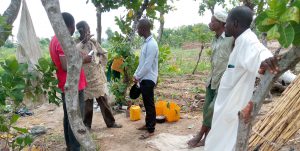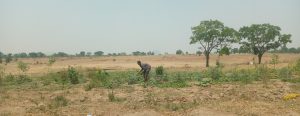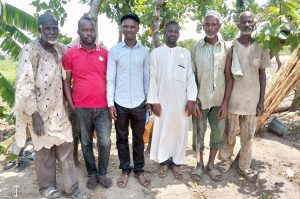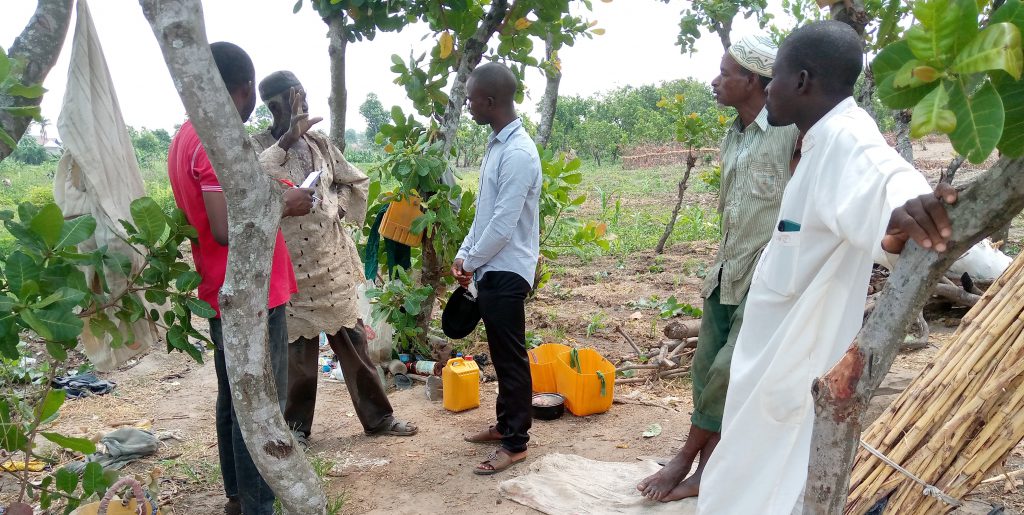Farmers at the Jiwa community in Abuja Municipal Area Council (AMAC) of Federal Capital Territory (FCT), Nigeria’s capital city have continued to recount how they are losing their beans farm to a change in weather, a condition they said was brought upon them by the climate change.
The farmers who spoke to MAWA-Foundation at a focused group discussion inside a farm located about 15 kilometres away from Dei-Dei town, shared how they have lost a huge amount of their beans harvests to a change in weather that is hitting the community as a result of climate change.
Mr. Bello Adamu, a farmer in the community who led his colleagues to the focused group discussion, narrated how the change in weather conditions that brought with it hotness in the atmosphere and acute shortage of rainfall led to the farmers’ recording of poor harvests in the community.
According to Adamu, the change in weather that brought an acute shortage of rainfall is adversely affecting their beans farm which largely depends on a reasonable amount of rainfall to produce reasonable yields.
“In the last two years, individually, each of the farmers in this community harvested over 20 bags of beans, but as of today, because of the change in weather, no farmer in this community can boast of a bag after harvest,” Adamu said.
The farmers who corroborated Adamu’s narrative pointed out that the rainfall last year stopped on the 10th day of October. A condition they lamented had a hugely adverse effect on their beans farms and income.
“Last year was our worst season, the rainfall stopped on the 10th day of October and that made our beans not yield sufficiently as expected” Haruna Garba added.
The farmers, also narrated how the change in weather is not only affecting their beans farms but destroying their vegetable farms. One after the other, the farmers gave an individual account of how their vegetable farms have been adversely affected by the change in weather. According to them, their vegetable farms depend largely on a reasonable amount of rainfall for efficient growth, but they now experience stunted growth and dryness as a result of an acute shortage of rainfall that has become prevalent because of climate change.

According to Mr. Mohammed Dikko, one of the farmers that participated in the discussion, the change in weather is not only making the vegetable farm yield poorly but reducing the market value of the vegetable. Explaining how that happens, Dikko said small vegetables the farmers manage to get out from their farms are not been patronized in the market because they do not look fresh having been hit by the dryness of weather and eaten up by pests.
“Even when we manage to get vegetables out of our farms and take them to the market, people do not buy from us because they look dry, with clear marks of pests spots on them,” Diko said.
The farmers pointed out that the only option available for them to mitigate the adverse effect of climate change on their livelihoods is irrigation farming. However, they disclosed the option is difficult for them because irrigation farming is very expensive and they cannot afford it as a result of the poverty they had experienced in the last three years.
“Irrigation farming which is the only alternative for climate change mitigation is difficult to operate. We do not have the money to buy a generator, dig boreholes, petrol to power the operation, it is expensive, we cannot embrace it” Garba said.
The farmers at the group discussion affirmed their knowledge of climate change but pointed out that their discussion with the MAWA-Foundation officials has opened their minds to further understanding of climate change and made firm commitments to sensitize other farmers in the community on climate change.
They, however, appealed to the government and development partners to carry out wider climate change awareness and education among the community residents with a special focus on farmers. This is even as they said apart from the MAWA-Foundation visit to the community to sensitize them about climate change, nobody from the government or any group has come to talk to them about climate change.

Explaining further, the farmers in a uniform voice said having found out that irrigation farming is expensive for them to operate, they are resorting to the use of local knowledge (crop rotation) as a means for climate change mitigation. They disclosed that the approach was inherited from their fathers and that it has been in practice for decades.
A senior official from the Department of Environment in the Abuja Municipal Area Council Authority, who spoke to MAWA-Foundation and did not want his name mentioned, affirmed that the government is aware of how climate change is impacting communities in FCT and other parts of Nigeria.
The official assured that the government is doing everything possible to address climate change.
“We are aware of the climate change impact on the communities, we are working to empower them for mitigation, adaptation, and resilience,” the official told MAWA.
Having found the enthusiasm among farmers in the communities regarding climate change awareness, we appeal to the Nigerian State and development partners to make huge investments in education and awareness.
And, in doing that, farmers and community champions must play an active role in designing the interventions and implementation.

This report was produced by MAWA Foundation with the support of MEEDAN

